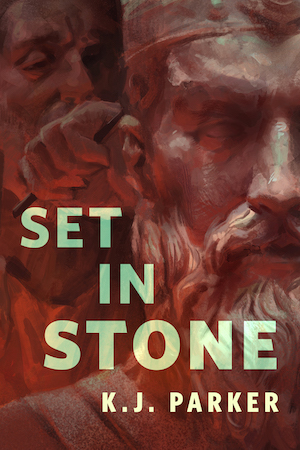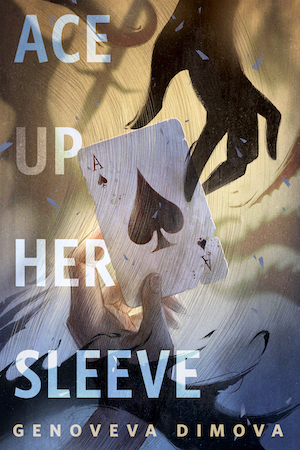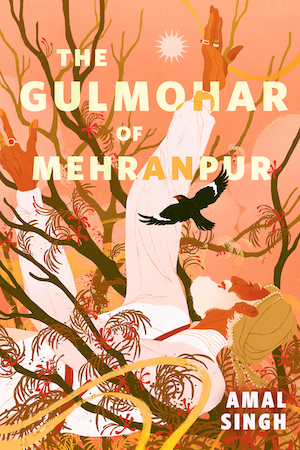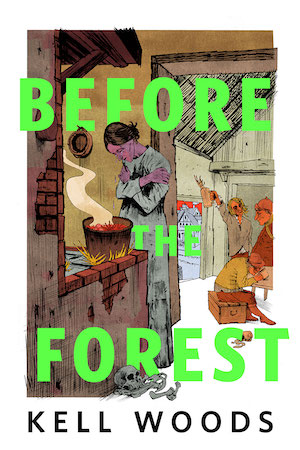Keep your eye on that Stoker Blake, he’s just so good at his job! Who can say why.
Summary
Moist lets more of the day go by, then hops outside the train carriage to run along the top of it and get a feel for the railway. He goes to sleep that night and, elsewhere, a dwarf attacks the granny of a railway worker, who throws her full chamberpot at him. They get into Zemphis, where laws are far more lax, and Moist almost has his head taken off by a boomerang, but Vimes saves him. The new and improved Iron Girder meets them there, and she has been significantly upgraded. The grags are planning to attack the train as it runs through the upcoming mountain range, the Paps of Scilla. They are attacked as soon as they make their way into the mountains and fight off the group with trolls, goblins, and a particularly talented stoker. Some kids try to stop the train as well, hoping to be heroes who saved it from a landslide they caused; Moist goes and talks to one of the kids’ fathers, asks them to clear the track of the landslide, and is sure to demand that none of the children are beaten for not having a clear grasp of the possible consequences of their scheme. They are welcomed to Ohulan Cutash, where the people are determined to feed them, and stay for dinner before heading on their way.
Later that night the train halts again; the decoy Flyer train has derailed ahead of them, and King Rhys managed to spot it and stop them just in time. They run into a group of gnomes who are terrified by the carnage and want to be left in peace. The water crane at the depot has been destroyed and the workers are missing. Detritus and Bluejohn go looking for them while the gnomes help them with the water reserves by heading to a nearby spring. Simnel asks the gnomes if they could make boots for railway workers much like their own. Moist forces many of the engineers to finally get some sleep during the day. Albrecht (who is getting daily updates from a goblin about Rhys’ progress) talks with Ardent, who will not change his mind. Simnel is worried about the bridge ahead being structurally sound enough to take the train, but Moist promises that they will fly across it. Moist inquires to Aeron about what secret Rhys is keeping, thinking of how strangely Simnel’s mother had behaved. He’s invited to an audience with the King only to learn that she is, in fact, the Low Queen, and means to finally end this ridiculous hidden gender business. Moist also figures out that Aeron is her lover.
They do indeed make it across the bridge, with Moist seeming to invoke magic to make it happen; in reality he and Adora Belle worked in concert to have golems shore things up. They are closing in on Bonk, which means that it’s the gran’s last chance to stop the train, and they make a good show of it. There’s fighting in top of the train and in the carriages, and the grags manage to uncouple the guard car, but Bluejohn has a handcart to get them back to the rest of the Iron Girder. Many of the attackers fall from the train and many more are captured. They arrive in Bonk and Rhys heads into Schmaltzberg after words making it clear that she will sit on the Scone of Stone and anyone who tries to prevent this might be killed. The fight is short-lived, as no one truly wants to wind up dead in this, and Moist is surprised, then cowed a little by Vimes pointing out that this is always the desired outcome. Rhys reclaims the Scone, has Ardent put away for a later trial, and announces to her subject that she is their queen—and their pregnant queen at that. Albrecht admits that he has been humbled of late and believes that Rhys is right in her convictions; he stands beside her and the matter is concluded.
Everything is settled. The bridge being out means that the dwarfs can keep Iron Girder around for the bit while things are repaired and see what’s possible with steam. Moist has a chat with the Iron Girder, who speaks to him and insists that she is, in some ways, a sort of goddess. Back in Ankh-Morpork, Drumknott is working with Charlie and Clown, who has been flawlessly impersonating Lord Vetinari for a couple of weeks. Moist makes it home and decides to devote some attention to the bank so he can have some calm for a bit. Sybil asks Vimes if they can holiday by train, once the line to Uberwald is fixed. Harry King is made a Lord and his wife a Duchess, and Simnel is given a knighthood and made a master engineer. Moist goes to see the Patrician and learns that Vetinari was disguised as the famed Stoker Blake throughout their journey on the Iron Girder. He asks what he gets for the whole affair, and Vetinari tells him he gets the gift of staying alive. Drumknott brings Vetinari to see a new goblin invention: a bicycle. Vetinari is impressed and suggests that the goblin get a patent lawyer and that the velocipede be sent to Vimes, as they might be of great help to the Watch. He wonders what will be made next as tinkers keep tinkering.
Commentary
Obviously, you had to have a fight on top of a train.
Though I appreciate the fact that Moist goes up on the roof of the carriages beforehand to get a feel for it because that’s a bit of realism that never comes into fight-on-top-of-train narratives, and it should? The idea that any person, no matter how fit, has that coordination down without ever experiencing it beforehand is absurd. (Okay, yes, the whole concept is pretty absurd, but adding just a whiff of common sense to things can ease a whole lot of disbelief in one go.)
We get a lot of notable moments throughout this section where Moist is thinking about how he views different species and adjusting his worldview accordingly. For example, when their party is attacked, he thinks first that the goblins are running away when they pour out of the train to defend the Iron Girder. He quickly corrects himself, noting that it’s old thinking on his part. It reminds me of an anecdote I encountered online where someone’s mother told them that your first thoughts are what you’ve been conditioned to think, and your second thoughts are what you really believe as a person. Whether or not that’s ultimately true, it’s a great way of giving yourself space to work through internalized prejudices, which is what Moist ultimately does in that moment.
Similarly, we have the moment when the party encounters the gnomes, who are desperate to get away and not get caught up in the fighting. Moist notes:
But the face of Slam suggested to him that the gnomes had been through the mill and come out as a very fine grist, and had been content to slip into obscurity and somehow were now drifting into a kind of sad oblivion.
It’s a very clever way of Pratchett noting that he never did much with gnomes in any of these books, and asking what that means contextually as a result. It may not have been his intent as an author to ignore them, but the fact that he did means that he should address it, so he makes the effort here. And it winds up being a suggestion that as a species, gnomes deliberately faded into the background until they are now coming up against a potential “unmaking” as it were, leading to extinction or something like it. The gnomes are given work by the end of that section, the possibility of a little reprieve, but it doesn’t stop this from being incredibly sad.
Queen Blodwen (formerly Rhys) also finishes the work that Cheery started years ago. While it’s not entirely certain how many years have passed between these books, in terms of our own timeline it was a twenty-year journey from Men at Arms to this moment. Which is flipping fabulous. A truly satisfying end-to-end change, from the bottom up.
It’s heartening to see a figure like Albrecht also choose change, despite being a very conservative figure, and it shows the path for anyone similarly minded. Albrecht comes to realize how much he is missing by adhering so strictly to his traditions. He becomes friends with the goblin messenger who is keeping him appraised of the situation, and knows that he would never have experienced this person otherwise, wouldn’t have spoken to him or learned about him. He wouldn’t have cared. And he finally understands that he is the one who loses in that scenario. That he has spent a lifetime making a habit of it.
Of course, the goal is to prevent fighting, and the heroic figures of the day manage just that. But most of the exciting reveals occur after the day is won and the chips are down. Am I mostly talking about the fact that Vetinari was, in fact, on the train the whole time, as the most impressive stoker in the pack, and that no one was ever the wiser? Yes. Yes, I am talking about that, and about how the advent of a reliable imposter in the Oblong Office means this guy can go anywhere now at any time as anyone he pleases, and I’m so sad that we didn’t get to read those books.
But, you know, he gets to go visit Margolotta whenever he likes now. And Harry’s wife gets to be a real Duchess, and Dick Simnel gets made a master, and Moist gets to live. Progress continues.
Asides and little thoughts
- There are a couple mentions of a character using a “jim crow” as a weapon, which is a little hard to find information on, but it is an implement used for rail-bending. No idea why it was given that moniker, however.
- Vimes ripping off his shirt so the dwarfs can see the Summoning Dark marking is spectacularly extra of him. Between that and the dramatic lighting of cigars to punctuate other people’s points, our boy is on form.
- I wasn’t entirely certain on the dates of invention for the steam locomotive and the velocipede respectively, but my assumption was that Pratchett put the bicycle in at the end for a reason. Sure enough, the first locomotive trial was 1802, while the first “dandy horse” didn’t show up until 1817. It’s one of those great historical facts that sounds wrong, which these books have always enjoyed playing with.
Pratchettisms
From what Moist remembered, the trees stood shoulder to shoulder. And if you thought that trees didn’t have shoulders, you hadn’t been to the Forest of Skund.
Cheery was looking very cheerful, as cheerful as any decoy could be who had been the winner of a battle and had come out more or less unscathed, except for a small scar which you had to have, didn’t you, or no one would believe you.
The delvers discovered all too rapidly that trying to fight while a a busy goblin was in your underwear was very bad for the concentration.
It was a sight to yodel for.
The Queen appeared as innocent as one of those mountains which year after year do nothing very much but smoke a little, and then one day end up causing a whole civilization to become an art installation.
“Tomorrow. That, Mister Lipwig, is what we can achieve. Tomorrow.”
Next week we start on the final (what how) Discworld novel, The Shepherd’s Crown. We’ll read Chapters 1-6.










